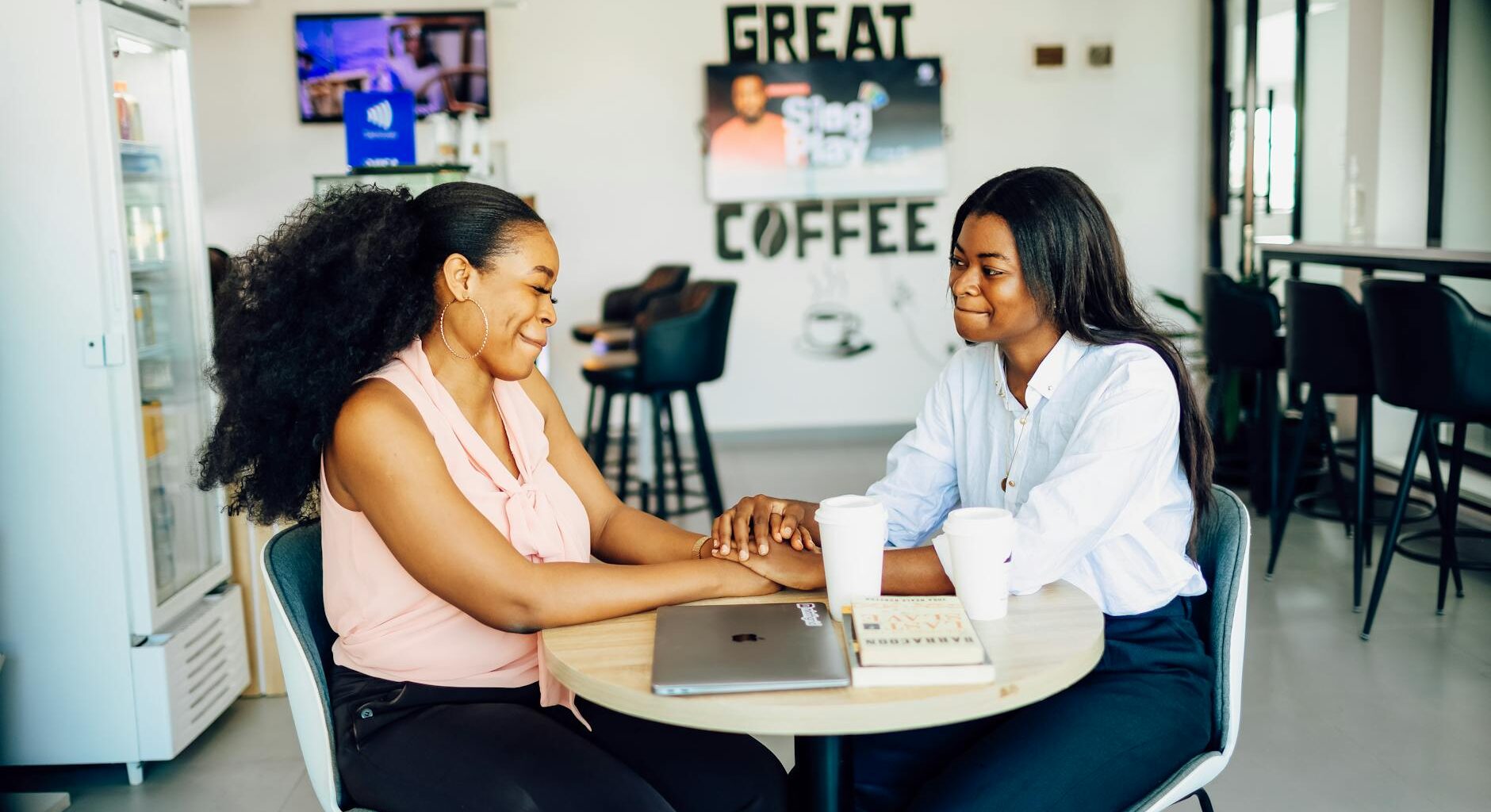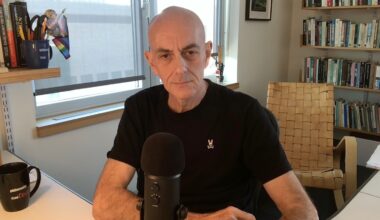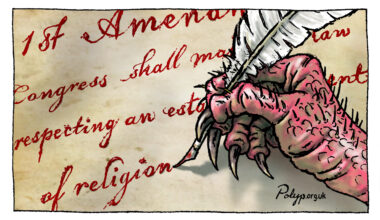Olakunle’s1 girlfriend was not very religious when they started dating in 2023, though she is a Christian from birth. Olakunle, a 20-something-year-old photographer and journalist from Ibadan, Nigeria, had to make it clear he was not religious at all. At first the girlfriend had no issue with this, only, perhaps, hoping that Olakunle, an ex-Christian, would convert back to Christianity. ‘I believe she had it in mind to, like, change me in the long run,’ Olakunle told me.
They argued frequently about the existence or nonexistence of a supreme deity. But that was it. Then she became even more religious in 2024. According to Olakunle,
She became very religious, very, very religious that I was even shocked, and, once, she told me that God is telling her to move away from anything that would stain her purity. In order to move closer to God, she had to move away or avoid anything that is not, like, [pure], [she had] to move to the light, [she had] to stay away from darkness. That’s just the way she said it.
They broke up five months later.
Barely two months after the breakup, Olakunle tried to find love on Tinder. It wasn’t successful, and he soon deleted the app. ‘I mean, you see all these profiles, and you’ll be, like, [discouraged]. You see all these details about [people’s] affiliations [on Tinder], and you see a Christian, you see people who are just religious. Yeah, I just deleted the app,’ he said.
For now, Olakunle is also not actively seeking a partner or a love interest in irreligious gatherings. He has tried to do so but also without success. This has tired him out. ‘You know there are intersections to this thing. I might find someone who is irreligious, but then are they the right person?’
He thinks that when people, even the religious—especially the religious—are looking for partners, they seek out people that share their core values: ‘So I think it’s the same experience for the irreligious. Even though the [dating] pool is very small. So that’s the case. The experience [actively seeking a partner in an irreligious gathering] was not encouraging. I guess that’s why I’m fed up.’
Searching for Love
On paper, Nigeria is a secular country, with its 237.5 million citizens free to practice multiple religions of their choice. There is indeed a plurality of religions, including African Indigenous Religions (AIRs), the Reformed Ogboni Fraternity, Judaism, Chrislam, the Grail Movement, the Baháʼí Faith, and Hinduism. But its Christian and Muslim populations are among the largest in the world; there is a predominantly Christian south and a predominantly Muslim north. The percentage of Nigeria’s population who are religious is placed at 93 and that of its population who are convinced atheists is only one.
It doesn’t help that the nonreligious are in danger of both physical and nonphysical harm if their lack of religious belief is known about. Many still live under a pretence, performing religiosity rather than being true believers. Consequently, being upfront about their disbelief of the God claim when romantically interested in a religious person is a decision they have to make carefully. But if they eventually meet freethinkers like themselves as love interests, they still need to look out, as Olakunle pointed out, for those who share the same values as they do.
Melvin is in his 20s, and his current partners are both religious. He became an atheist in 2019 but never came out to his previous partner, who is a Christian. He saw how devoted the partner was to Christianity and thus feared the fallout that might ensue. ‘I didn’t want to have the whole conversation about “why are you an atheist?” and “why don’t you believe in God?”,’ he told me.
At the time, he was also keeping up an appearance as a spiritual person. ‘I was still under the veneer that I was spiritual—but not religious—in a bid to avoid the whole conversation [of] why don’t I go to church [or] why I avoid all of the religious practices he [the partner] was involved in.’
They therefore didn’t discuss religion before they got into the relationship. The conversations were more about their personalities and the things they both liked. Now, Melvin disapproves of that approach. ‘In a [sic] hindsight, it was not good. It’s best to put things in the open before you get into something,’ he said.
These dynamics in romantic relationships have left Nigerian freethinkers in search of love few to no options. Melvin has never dated an atheist. ‘I have met atheists but I haven’t met those atheists that we could move forward into having a relationship. So all the people I have been in relationships with are religious people.’
Besides, he believes atheists are hard to find within the queer community. In his experience, queer people, though queer, are not willing to let go of their religious beliefs. Their religious beliefs, just like their sexuality, are an integral part of them:
People who are willing to admit their doubts and suspicions about their beliefs are not easy to come by, meaning the queer people I’ve met, they’re religious, they’re Christians or Muslims. But there’s this cognitive dissonance where they compartmentalise their religion and their sexuality. So it doesn’t matter that their religions basically preaches [sic] against this [being queer], yet they’re willing to freely accept their sexuality.
Jade, a 20-something-year-old university assistant, also thinks that there are not many atheists around her. As she told me:
I don’t meet a lot of them in my regular life. Almost everybody I meet is religious, everybody has one religion or the other. I can count the people I know that are irreligious. Maybe like three or four people that I know that are irreligious my entire life. It’s like I got to know them before I even know that about them [being irreligious]. Maybe some people are now pretending, but based on my environment a lot of people are religious.
A Twinder for Atheists
The Nigerian-American scholar and researcher Dr Uju Anya, who is in her late 40s, has lived in the US since age 10 but considers herself culturally Nigerian. She is a popular figure on Nigerian Twitter (now X), where she speaks to her large following about the plight of minority groups. Anya has always thought visibility important for members of minority groups, religious or otherwise. She herself has been publicly visible and publicly available. She has had members of the same minority groups as her—women, queers, atheists—reach out to her: for advice, for support, for money, for anything. ‘Visibility is my ministry, my calling, my vocation,’ she told me.
In May 2021, a Nigerian atheist who was dating a Christian woman messaged Anya on Twitter seeking relationship advice. The young man was facing pressure to attend church and, if they later married and had children, to raise the children as Christians.
Anya wrote him back, saying:
I understand what it is you’re going through. A lot of nonbelievers, you know, have social pressure [in] relationships. But do understand that the [more] serious you get with the woman the more somebody is gonna resent somebody, because she’s not gonna change you and make you a believer, and you’re not gonna change her and make her stop believing, and, as the relationship gets more serious and even children coming into it, somebody is gonna make somebody…resent somebody and hate somebody, because it’s the person that has to bend that will resent and hate the other person for forcing them into this situation.
She told the young man that, from all he had told her, he would be the one to bend. She told him he would have to make peace with this if he continued dating the woman.
Later, Anya posted her conversation with the young man on Twitter, both to let young nonbelievers in relationships with devout believers know what their future might look like and to give them her honest advice. In response, Anya was asked by a follower to make a post or thread to match Nigerian freethinkers because they were so isolated and didn’t know where to find each other to date. Anya was uncertain, but when, later, a friend challenged her to do it, she started Auntie Uju Anya’s Matchmaking Threads.
Before then, while she was still single, Anya used to watch out for Cherrell Brown’s Twinder on Black Twitter. Twinder is a portmanteau of Twitter and Tinder and functions as both. People shared their pictures and captioned them with their details and dating preferences under the hashtag #Twinder, and anyone who was interested could then comment or message the author. Or, if they didn’t want to call attention to themselves, they could simply like multiple pictures of the post author, and the author, if they reciprocated, could message a liker. Frequently, Brown, who had a large following, would step in and repost Twinder posts that caught her eye. Anya was inspired by this:
So, somebody was telling me I should be matchmaking atheists, and then I remembered Twinder, and I used to think it was so much fun. [It] was such an effective way of doing matchmaking, especially on Twitter, because when you’re on Tinder, all you really see is people’s pictures and whatever they say about themself. If you’re matchmaking on Twitter, you get to look through that person’s profile and you get a lot of information about, you know, their politics, their history, things like that. And you get to know a lot more about people than just on Tinder.
Twinder provided a model for Anya in creating her Auntie Uju Anya’s Matchmaking Threads. ‘That was what I did: a Twinder for atheists,’ she said.
Soon, Anya started creating matchmaking threads under which Nigerian atheists posted their pictures, details, and preferences. Anya would then step in to respond and gas up post authors. She also encouraged people who could not openly identify as atheists to like posts in case this elicited a response from the post author. She was also putting up anonymous posts on behalf of people who could not openly identify as atheists, especially apostates from the north who risked death for leaving Islam. The anonymous atheists could then slide into the direct messages of anyone they were interested in who had liked Anya’s post on their behalf.
About a year or two later, Anya got a response from the young guy who had sought her advice about his relationship with a Christian woman. He told Anya that he had broken up with her and that he was now in a relationship with a nonbeliever like himself, which was much better for him. ‘It was so good to get that follow-up and [that] at least in that particular relationship he found a better way, I believe,’ Anya said. ‘Because it’s really [difficult] and I’ve only seen it work on one occasion, I’ve only seen one couple of an atheist woman and a Christian man [turn out right].’
She also posted his follow-up. ‘I think this also puts me in the public as somebody who cares about atheists and agnostics finding each other, especially those who live in places where it’s dangerous [to be a disbeliever],’ she said.
In like manner, she encouraged others to send in their follow-ups.
Soon, the matchmaking threads began to expand. Queer people wanted in just as straight people wanted in. And so Anya expanded the threads to include everybody: atheists, queers, ‘fine aunties’, straight people. ‘I can also tell you that the atheist, agnostic, and queer communities overlap a lot,’ Anya told me. ‘So, when I was doing it for queer people, I believed I was also doing it for the atheist market as well.’
There were no metrics to judge how successful the threads were or how many people participated, since some people slid secretly into the DMs of those who had liked their posts. But some of the threads racked up thousands of likes and hundreds of replies and reposts. And it is possible people still go through the threads and make connections to this day. Says Anya:
I cannot also tell you how many people, after the threads were over, went there, years after, months after, to look through and just make connections with people who were interacting with those threads. So [the threads] just live there and is [sic] sort of a permanent archive for people to access when they need to.
The matchmaking stopped in mid-2023. It was not always going to be sustainable for Anya. ‘A lot of people forget I have a full-time job,’ she joked. Seeing a single thread through required, by her account, three or four hours of full-time engagement. She could only manage this workload for a while.
Besides this, Anya says, Elon Musk’s takeover of Twitter, now X, changed the atmosphere:
Twitter is not fun anymore. I used to do the matchmaking thing and it was just a lot of fun. I had a great time. But Twitter became a non-fun place. Twitter is now overrun with bots. It’s just a lot of hateful elements. Twitter was always difficult. You know, you always had to fight and be aggressive to survive on Twitter. But just the way it turned into a hate site is ugly. So, I don’t do fun things on Twitter anymore, and matchmaking was a fun thing.
And being able to see who had liked a post, which was necessary for the matchmaking, is a feature that was disabled under Musk, meaning those who couldn’t publicly post and call attention to themselves were deprived of a way to meet new people.
Love With a Caveat
To address the difficulties atheists have finding love, Olakunle suggested irreligious dating apps. ‘Maybe dating apps for irreligious people to meet. I mean, we have dating apps for queer people. We have Grindr, we have other apps for queer people to meet and date and commune together,’ he said. He thinks parties, clubs, and raves exclusively for atheists might help, too.
Like Olakunle, Melvin believes a dating app for irreligious people and people belonging to religious minorities could mitigate the problem:
This answer [might be] on the nose, but there should be an app that caters to nonreligious people. These people do not have to be atheists. They could be agnostics, polytheists, Buddhists, people who are outside dominant religions, basically. Now we have dating apps for Muslims, dating apps [for] Christians, why can’t there be a dating app for atheists and nonreligious people?
He thinks that this is especially needed because general dating apps can allow for religious discrimination. He thinks people might swipe past someone’s profiles if the person has openly identified as an atheist:
I’m aware that dating apps allow for people to show their religions if they’re Christians, Muslims, atheists, agnostics, and whatnots. This is a more general app, right? And this can also put them in line for discrimination. People might [swipe past] their profiles because they see they’re an atheist or agnostics [sic] or whatever. But if there’s an app catering to this [dating for nonbelievers], that would be nice.
Melvin, who is a member of the Nigerian chapter of The Secular Community, a global network of nonbelievers, thinks atheist communities are usually too scholarly, which inhibits opportunities for dating. He believes this could be rectified if secular communities allowed for fun activities and spaces where members can mingle and date:
A lot of nonreligious communities tend to be scholarly, you know, dissecting the Bible, dissecting religious entanglements with society, culture and politics. So it doesn’t really create space for much romantic entanglements or engagements. But if there are more free areas for just fun for nonreligious people this would be welcome, I think.
The Ranting Atheist, the leader of the youthful Nigerian Atheists on Discord, when asked if the community matchmakes atheists, said their matchmaking plans had been difficult to execute. ‘It’s been tough to get it off the ground for some reasons,’ he told me. ‘Most important is the know-how, because without a proper system and planning, things can go south quickly.’ There is another setback: a lack of models. ‘[I] don’t know of any atheist community doing such.’
For her part, Jade believes there are two ways to better the dating experience for atheists in search of love, but also thinks them impractical:
If more atheists are openly atheist and if more religious people are more accepting, [the dating pool for atheists can get wider]. Neither of those options are viable for many reasons [because] these situations are not changing soon.
Anya thinks a dating app would be great, but also thinks it could be problematic. She expects that such dating apps would need to be public so that users can verify and confirm the identities of the strangers they are about to meet. ‘For security reasons, a dating app has to be public,’ she said.
But these apps also need to be anonymous for the safety of those who cannot publicly identify as nonbelievers. ‘For nonbelievers to survive very hostile and stigmatised situations, they have to be anonymous and cannot have their identities traceable.’
She worries about how atheist dating apps will solve this paradox:
There is an inherent mismatch between the needs of a public app and the needs of the people who are dating there. And so it’s very difficult. I personally will never advise a woman—especially a woman who’s dating men—to go on any app where the men are allowed to be anonymous. That is a recipe for a lot of problems.
And I usually see it as an app that is going to be very male in the population. We already have the problem of nonbelievers’ organisations and groupings being majority male, and not just majority male but also majorly misogynistic as well. They don’t believe in God, but they definitely believe in patriarchy, which, funny enough, was conferred by God.
There is another problem: catfishing. Queer people for one had been victims of kito, a specific type of catfishing whereby queer people, under threat of being outed, are extorted. ‘I think a dating app for nonbelievers in Nigeria will be very ripe for kito [and blackmailing], especially if people want to keep anonymous,’ Anya said.
Anya would thus not promote atheist dating apps which do not address these inherent problems. ‘I see it as a space that is potentially going to be unsafe, especially for women, and I’m not gonna promote something like that.’
Like Jade, what she will promote instead is more visibility for atheists. ‘Those of us who are in a situation where we can be open in public with our atheism, we definitely should.’
Nigerian atheists seem to have been shunning mainstream dating sites and apps like Tinder, while AfroIntroductions, a niche dating site created by the matchmaking company CupidMedia, seems to be unpopular, despite having an atheist segment for African nonbelievers: none of those interviewed for this story had heard of it. Given that dating apps and sites are not popular among Nigerian atheists, and if many atheist organisations, virtual and physical, are not yet matchmaking their members, safe and public solo efforts like that of Anya’s remain the only viable way for Nigerian atheists to date.
After Olakunle suggested dating apps and parties and raves to boost the chances of atheists looking for love, he said, ‘There are some people that are doing good work concerning this. Uju Anya, for example, used to do this poll for…irreligious people to meet and hopefully to get you to be in a relationship, that kind of stuff.’
The demand for a safe, public platform for Nigerian atheists to find love is there, in other words. How this can be achieved is as yet unclear, which means, sadly, that Nigerian atheists will continue to be marginalised even in the most intimate of spheres.
- Not his real name, which has been changed to Olakunle for safety purposes. ↩︎
Related reading
How I lost my religious belief: A personal story from Nigeria, by Suyum Audu
Protecting atheists in Nigeria: the role of ‘safe houses’, by Hank Pellissier
Secularism in Nigeria: can it succeed? by Leo Igwe
Mubarak Bala speaks out on his imprisonment and release: ‘Things shall be set straight’, by Mubarak Bala
Report: first-ever atheist billboard in Africa unveiled in Ghana, by Accra Atheists
A new pact for atheism in the 21st century, by Leo Igwe









Your email address will not be published. Comments are subject to our Community Guidelines. Required fields are marked *
Donate